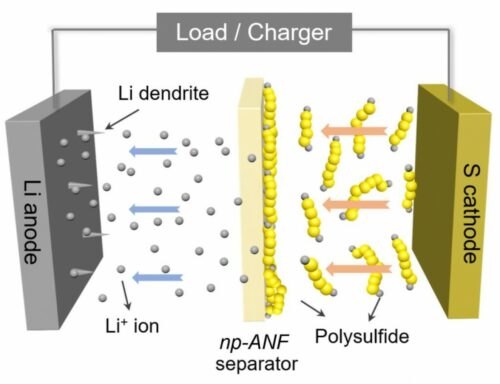This paper-thin polymer coating is changing the game, and lithium-sulfur batteries could be the future of energy storage.

A development is taking place in energy storage Down Under, and it’s not a sequel to the Crocodile Dundee franchise. Australian scientists have discovered better lithium-sulfur (Li-S) battery batteries that could reshape the landscape for electric vehicles and smartphones. Conceived at Melbourne’s Monash University, battery design promises many advantages that eclipse the traditional lithium-ion batteries we’ve grown accustomed to – batteries we often begrudgingly replace. With an astounding fivefold increase in energy capacity at half the cost, this new battery technology appears to be the long-awaited Holy Grail.
At the heart of this breakthrough lies a strategic reduction in lithium usage and a significant battery life boost. The team has introduced a “nanoporous polymer-coated lithium foil anode,” a sleek, cost-effective design that delivers enhanced energy storage. Li-S batteries had a penchant for “unwanted chemistry.” When lithium anodes and sulfur cathodes mingled, dendrites, treelike structures, would form, compromising both the battery and the electrolyte. Consequently, these batteries often retired after 50 cycles, occasionally culminating in dramatic short circuits and flammable electrolyte fires. It was like a soap opera in the world of batteries, with lithium-ion batteries occasionally having fiery performances.
The researchers have devised a solution to these issues. Their paper-thin polymer coating, riddled with minuscule holes less than a nanometer wide, is a guardian. It allows lithium ions to move freely while blocking interference from other troublesome chemicals. This coating is a custodian and support system, aiding lithium in its charging and discharging duties. They make metallic lithium analogous to a teenager with boundless energy; a bad battery just wastes that energy. If harnessed correctly, this energy can lead to outstanding storage devices that are easy to manufacture. This new coating brings us closer to efficient Li-S battery production.
The team mentioned that this study lays the foundation for shielding Li-metal from rapid decay, which has long been the Achilles’ heel of Li-S batteries. These batteries could revolutionise a market hungry for advanced energy solutions, particularly as the demand for electric vehicles, aircraft, and electronics surges. While the Li-S battery currently basks in the spotlight, it’s crucial to remember that the battery arena is vast and dynamic. Emerging contenders like zinc-ion, sodium-ion, and iron-air batteries also strive to claim a market share, challenging the long-standing reign of lithium-ion technology. The future of energy storage is electrifying, and the world is watching with bated breath as these innovations unfold.






